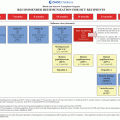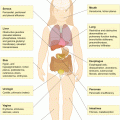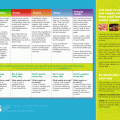Stages
Goal
Activities
First Stage
Exploration/Assessment
• Assess career development stage and needs
• Assess career variables i.e., interests, aspirations, personality, barriers, etc.
“Getting to know you”
Second Stage
Develop and Identify Goals
• Concretely define both short term and long term goals
“What are your dreams?”
Third Stage
Planning Action Steps
• Identify and define behaviors necessary to achieve both short and long term goals
• Identify alternate or contingency plans
“How do we get there?”
Fourth Stage
Evaluate Progress and Adjust
• Regularly evaluate progress
• Identify barriers and develop coping strategies to overcome barriers
• Make adjustments to goals and action steps if needed
• Provide encouragement to persevere
“Accountability and encouragement”
24.5 Career Counseling of Pediatric Cancer Survivors
As the literature review indicates, not all survivors of childhood cancer will warrant career and vocational intervention. However, there are subgroups and risk factors for developing career and employment issues that have been identified through research. Knowledge of these can assist in identifying those who might benefit most from career services and interventions, especially as a preventative measure for future occupational problems. Therefore, it is imperative to identify survivors who may be at the highest risk of developing these issues, and utilize a preventative approach to career counseling and intervention.
Following is a list of risk factors that have been previously identified in the literature (not listed in order of significance):
Bone tumor diagnoses [26]
Chronic medical conditions after cancer treatment [26]
Motor impairment or epilepsy [22]
Physical limitations or restrictions [41]
Young age (less than 4 years) at diagnosis [26]
Female sex [26]
No high school diploma [26]
Lower education level achievement [22]
Lower intelligence quotient (IQ) [22]
Belief that cancer treatment limits employability [32]
Maladaptive psychological coping with illness experiences [42]
Our recommended model for career counseling provides basic career guidance support services to all pediatric cancer patients, especially considering that many will miss the opportunity for such services at their home school campuses. Basic career guidance can include education regarding post high school options, assistance with college or vocational school applications, assistance with searching and obtaining financial aid, career assessments, career counseling, education regarding accommodations and rights for disabilities in both academic and employment settings, and so on.
An imperative step in providing career services is to initially educate the medical staff regarding the availability of career counseling services to recruit referral sources. In addition, outreach opportunities such as organizing career or college fairs proximal to the main clinic has been very successful in our setting in terms of providing education, increasing awareness of patients with regards to available career counseling services, and recruiting potential candidates for service. If career counseling is a service that is unavailable, referring patients to the Cancer and Careers website would be an alternative and beneficial resource. Cancer and Careers is a comprehensive website for cancer patients and survivors that provides educational publications, career coaching, support groups and educational seminars for those dealing with cancer and work related issues. Although Cancer and Careers is not specifically for pediatric cancer survivors, it offers a wealth of information, resources, and interactive tools to assist in the career development process. Please see http://www.cancerandcareers.org/en for more information.
Once a patient is referred or identified for services, the next step is to assess the potential risk factors for future educational or career and employment difficulties. During this initial assessment, risk factors identified by the literature, a thorough evaluation of the patient’s career development process, potential barriers to career choice, and availability of support and resources should be assessed and evaluated.
In addition to the general career counseling goals, when providing career services to cancer patients and survivors, it is vital to also assess potential effects of the cancer diagnosis and treatment and how these might impact career goals, especially physical and cognitive sequelae. For example, if a patient has a career goal of becoming a professional athlete and he/she is facing lower extremity limb salvage, it will be important to sensitively and respectfully address how this treatment may impact future career plans and goals. Nearly 50 % of pediatric cancer survivors had to change educational plans as a result of their illness and 38 % reported changing their original career goals as a direct result of their cancer diagnosis [37]. The earlier this is addressed and alternative career goals developed, the sooner emotional distress and potential career problems are avoided.
24.6 Case Illustrations
24.6.1 Case Study 1
Steven is a 19-year-old male who was diagnosed with a pineal germinoma brain tumor at the age of 14 years old. Unfortunately, due to several tumor recurrences he had been on treatment for the past several years, which began when he was in the 9th grade. He was treated with resection and radiation to the ventricles and pineal region, and various chemotherapies. At the time of referral for career counseling, he was declared to have stable disease and continued to receive maintenance chemotherapy.
Most of his high school years were accomplished through homeschooling and online courses. Historically, he was reported to have high intelligence and was a successful student. As a result of excellent academic abilities and extraordinary determination, he graduated with a high school degree and began taking classes at the state university. Despite experiencing significant physical and cognitive side effects of both his brain tumor and treatment, he was attending college classes without any academic accommodations. Unfortunately, he recently became unable to keep up with his classes and began to fall behind. At the recommendation of his nurse, he agreed to a consultation with the career counselor to assist with current academic difficulties and for general academic planning.
Steven is an example of a pediatric cancer patient who continues to receive treatment while simultaneously pursuing academic goals. A career counselor would be ideal in assisting Steven in developing both proximal and distal academic goals that would lead to his future career goals. An immediate and practical need that Steven presented with was to assess his current academic standing and to provide counseling whether it was in his best interest to continue his courses or to consider a medical withdrawal. In situations like these, the decision needs to take into consideration the current time period of the semester (e.g. second week of the semester versus the week before finals), how behind the student is in terms of assignments and exams, and medical prognosis of symptoms (e.g. if side effect symptoms were expected to worsen or improve). If it is early in the semester, than a medical withdrawal might be appropriate, especially if symptoms impacting academic difficulties are not expected to improve. However, if the semester is almost over and majority of assignments and exams have been completed, then the counselor may advise Steven to negotiate “incompletes” with his professors and request additional time beyond the end of the semester to complete the course requirements.
Another priority need that Steven presents with is the need for evaluation for disability services that would provide academic accommodations including a referral for neuropsychological evaluation with a provider familiar with the possible cognitive late effects of cancer and its treatment. Once the results are presented, the career counselor could assist Steven in applying for appropriate educational accommodations and provide advocacy if there are any barriers or resistance. Even if the decision is made to withdraw from courses in the current semester, initiating an application for disability services will ensure that appropriate accommodations will be in place upon his return to school. Many college campuses may be unfamiliar with pediatric cancer survivors’ difficulties, many of which can be addressed by the career counselor providing education and advocacy on behalf of the patient.
Finally, career counseling to assess and develop educational and career goals will be beneficial so that Steven is able to concentrate his resources towards his goals. For example, if he is able to declare a major early in his college years, then he may be able to narrow down the number of classes he takes for exploratory purposes. This can also be helpful in terms of planning the courses he takes each semester by attending to factors such as not registering for too many demanding courses in the same semester or taking advantage of alternative course formats such as online courses to increase flexibility and independence of the student.
24.6.2 Case Study 2
Alison is a 22-year-old female who is a long-term survivor of osteosarcoma of the right femur which was initially diagnosed at the age of 13 years. Alison received chemotherapy and a limb salvage procedure at the age of 14-years. At the time of referral, Alison was taking classes at a community college while working full time as a sales representative at a cellular phone service center and store. Fortunately, her employer provided health benefits which were not typical of most jobs for which she was eligible for. She reported that it was imperative for her to sustain her employment with this company due to the health benefits. Alison’s work duties involve assisting customers either on the sales floor or behind a counter, by constantly standing on her feet. She had not disclosed her cancer history to her manager nor requested any accommodations mostly in fear of any negative reactions or repuraussions from her manager and coworkers.
Alison reported that for the past couple of months she has had pain that worsened at the end of the day in her right hip and legs. She was recently evaluated and diagnostic imaging confirmed no evidence of disease in her right leg. Her physician recommended reducing the amount of physical activity, including time spent standing. When Alison disclosed to her nurse practitioner that she was conflicted between wanting to relieve her pain and needing to work, her nurse practitioner recommended a consultation with the career counselor.
Alison reported to the career counselor that despite her discomfort and pain, she was unable to support herself financially if she worked fewer hours. She was also fearful of losing her full time status because she would then be ineligible for health coverage benefits if she worked part time. Alison also struggled with the idea of disclosing her medical history and current pain issues to her manager.
First, the career counselor should provide education regarding the American with Disabilities Act (ADA) including ideas of reasonable accommodations that might assist Alison in being able to continue working full time. Examples of reasonable accommodations may include furnishing a stool for Alison to sit down on, allowing frequent breaks during her shift, or changing work duties to only assisting customers from behind a counter or at a desk, and so on. It will be imperative that Alison comprehends her legal rights afforded by ADA and the implications that will follow if she decides to utilize the law. In order to claim accommodations under ADA, Alison will be required to demonstrate a disability which would lead to the necessity of disclosing her medical history.
Therefore, it will be equally important to explore and problem solve a resolution regarding the disclosure of Alison’s cancer history. If Alison prioritizes not disclosing her cancer history, then she will need assistance for alternative solutions such as seeking alternative employment. If she chooses to disclose her health history and apply for accommodations at her current place of employment, then counseling to support her through the process and to cope with her manager and coworkers’ reactions would be greatly beneficial.
Stay updated, free articles. Join our Telegram channel

Full access? Get Clinical Tree







